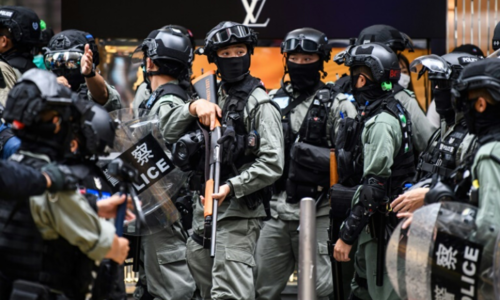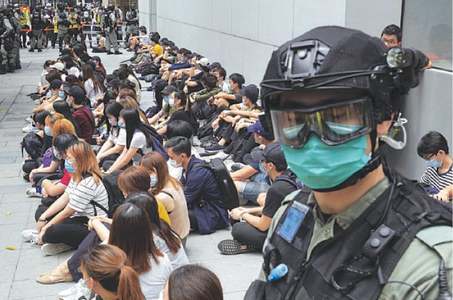BEIJING: China’s legislature on Sunday began reviewing a controversial national security bill for Hong Kong that critics worldwide say will severely compromise human rights in the semi-autonomous Chinese territory.
The National Peoples Congress Standing Committee took up the bill at the start of a three-day session, China’s official Xinhua News Agency reported. China has said it is determined to enact the law, and its passage is expected by Tuesday.
The US says it will respond by ending favorable trading terms granted to the former British colony after it passed to Chinese control in 1997. The Senate on Thursday unanimously approved a bill to impose sanctions on businesses and individuals including the police that undermine Hong Kong’s autonomy or restrict freedoms promised to the city’s residents.
The Senate bill targets police units that have cracked down on Hong Kong protesters, as well as Chinese Communist Party officials responsible for imposing the national security law. The measure also would impose sanctions on banks that do business with entities found to violate the law.
Last week, a former United Nations human rights chief and eight former UN special envoys urged the body’s secretary general to appoint a special envoy on Hong Kong over what they said is a pending humanitarian tragedy. Britain has said it would grant passports to as many as 3 million of Hong Kong’s 7.8 million people.
Beijing has denounced all such moves as gross interference in its internal affairs.
The law would criminalise secession, subversion of state power, terrorist activities and colluding with foreign forces to endanger national security. Critics say Hong Kong’s legal statutes already account for such matters and that Beijing is determined to use the law to pursue political opponents.
The central government in Beijing also would set up a national security office in Hong Kong to collect and analyze intelligence and deal with criminal cases related to national security.
Few details have been released, but it appears that Beijing will have ultimate power over government appointments, further reducing the relative independence it promised to Hong Kong in a 1984 joint declaration with Britain that is considered an international treaty.
The measures have been widely seen as the most significant erosion to date of Hong Kongs British-style rule of law and high degree of autonomy that China promised Hong Kong would have under a one country, two systems principle.
China has long demanded such a law for Hong Kong, but efforts were shelved in the face of massive protests in 2003. Beijing appeared to have lost its patience in the face of widespread and often violent anti-government demonstrations in Hong Kong last year, moving to circumvent the city’s own legislative council and enact the law at the national level on what critics say are weak legal grounds.
On Sunday, opponents of the bill staged a protest in Hong Kong, with police using pepper spray and arresting 53 people on suspicion of unlawful assembly, according to Hong Kong broadcaster RTHK.
Published in Dawn, June 29th, 2020













































